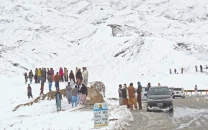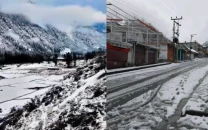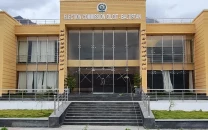Better hygiene: Drinking water schemes to benefit 7,500 people
Projects aimed at curbing diseases in Ghizer and Hunza valleys of G-B.

At least 7,500 people in Gilgit-Baltistan’s (G-B) Ghizer and Hunza valleys will benefit from drinking water and sanitation schemes being launched by the German government in collaboration with a local NGO.
Earlier this week, the projects were inaugurated in Faizabad and Dal Sandhi in Ghizer district and Aliabad in Hunza-Nagar district to meet the longstanding demands of locals.
“We have been saved from the curse of diarrhoeal diseases,” Hunza resident Tasleem Bano said on Saturday.
The facilities were inaugurated by German Ambassador to Pakistan Dr Cyrill Nunn. He was accompanied by German First Secretary Barbara Voss and officials of the Aga Khan Development Network (AKDN).
“The German government and the Aga Khan Development Network (AKDN) have inaugurated the schemes as part of a €9.4 million grant (Rs1.25 billion) announced in 2010,” read a press release issued by AKDN.
Speaking on the occasion, Dr Nunn applauded the role of AKDN and its affiliated agencies, saying that over 300 villages in Gilgit-Baltistan and Chitral now have access to safe drinking water and sanitation facilities.
He also commended the communities which contributed to the implementation of the scheme.
Aga Khan Planning and Building Services (AKPBS) Chairman Hafiz Sherali urged community members to ensure proper maintenance of what he called one of their most valuable assets.
Nearly half the population in G-B and Chitral reportedly does not have access to safe drinking water or adequate sanitation facilities. Families usually collect water from open and contaminated channels, thus falling victim to waterborne diseases.
Published in The Express Tribune, August 17th, 2014.


















COMMENTS
Comments are moderated and generally will be posted if they are on-topic and not abusive.
For more information, please see our Comments FAQ